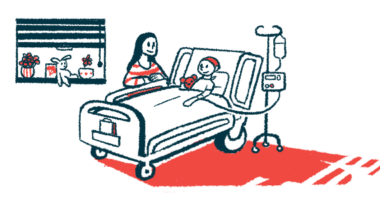Cuddly Aflac Social Robot Ducks Aim to Comfort Children With SCD

The supplemental insurance provider Aflac is expanding its “My Special Aflac Duck” social robot program to benefit children with sickle cell disease (SCD).
Healthcare professionals and nonprofit organizations can order the life-sized robotic companion for free for children ages 3 and up who have cancer or SCD. The social robot ducks are meant to give comfort and relief to pediatric patients. The ducks can be ordered here.
Aflac originally designed the cuddly robot to help pediatric cancer patients in their journey, and has delivered more than 13,000 of them to date.
“We are excited to expand the ‘My Special Aflac Duck’ program, particularly as the sickle cell community is underserved and the disease itself is underfunded,” Audrey Boone Tillman, Aflac’s executive vice president and general counsel, said in a press release.
“‘My Special Aflac Duck’ has done an incredible job helping provide comfort to children with cancer, and we are confident that it will provide the same reassurance to kids with sickle cell. These families need help, and if Aflac can help provide some measure of relief, we are ready to take on that mission,” Tillman said, noting that SCD “often robs children of a ‘normal’ childhood, causes great pain, and can even lead to premature death.”
Two years ago, Aflac collaborated with “My Special Duck” creator Sproutel, a patient-centered research and development company, to work with patients, parents, and healthcare providers in a pilot program to adapt the robot for those with sickle cell, a blood disease that affects more than 100,000 U.S. residents.
Those research-based adaptations included an app and a blanket, since children with SCD are often susceptible to temperature changes. Children can draw on their blanket, which comes with a water-soluble marker. Other additions include medical “play” accessories that are specific to the needs of young people with sickle cell.
In addition, the duck’s interactive app, which patients can use to experience the animal’s virtual world, has been enhanced to include a focus on art therapy and topics such as hydration to help young patients learn how to manage their disease.
The soft, furry companion also comes with “feeling cards” that children can use to communicate their emotions, and includes sounds that typically emanate from the forest, ocean, farm, or amusement park for use in distraction therapy.
“The inclusion of ‘My Special Aflac Duck’ for our patients with sickle cell disease is a welcomed addition to our program,” said Tamara New, MD, medical director for the sickle cell program at the Aflac Cancer and Blood Disorders Center of Children’s Healthcare at Atlanta Egleston Hospital, in Georgia. It hosts the largest sickle cell program in the U.S., according to Aflac.
“Children with sickle cell disease deal with a unique set of circumstances, including a stigma that can impact mental and emotional health as well as physical health. ‘My Special Aflac Duck’ is a companion that encourages them to do the things that they might not always want to do, but that they need to do from a healthcare perspective,” New said.







